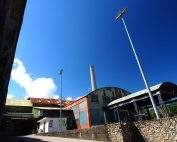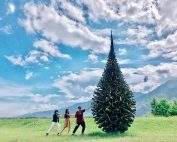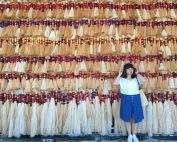East Valley line of Taiwan – back mountain pastoral literary style
The quiet East of the Flower Valley plain, the air is sweet, the light is clear, its plain, quiet, with a kind of reclusive pastoral wind, it also seems to be the last piece of pure land isolated from the world. The wind from the mountains, the green roads among the fields, the rice fields with flowing golden ears, is like walking into an idyllic, pure and clear artistic conception. The beautiful countryside that we pick up by walking slowly makes us release ourselves, and also enables the weary heart to land. The pure land makes people yearn for, and the artistic style here also makes people feel at home.
Taitung boasts a pristine natural environment and abundant natural resources. Nurtured by green mountains and clear waters, it yields a variety of high-quality agricultural products. This has led to the development of a “people and nature”-centered slow economic travel model. The “Taitung 2626 Market” is located within the Wuling Green Tunnel. It is a collaborative effort of Taitung locals who share a deep love for their hometown culture. They aim to promote the excellent products of Taitung farms and tribes. This initiative became a reality under the call of the Yong’an Community in Luye Township. (Photo Credit:IG@_wilson__wang_ 、@lucy561123 )
The “Taitung 2626 Market” runs under an independent operational model. At the moment, the market is open every other Saturday afternoon from 2 to 6 on even weeks. If you’re planning a visit to the Wuling Green Tunnel, why not take the opportunity to drop by the Taitung 2626 Market during this time? Experience a leisurely afternoon in the lush shade of the forest road, savoring the relaxed and unhurried pace of Taitung!
The “Taitung 2626 Market” positions itself as a rural weekend market with a diverse and open theme. It encompasses organic, environmental, creative, local production, handmade products, and even includes leisure experiential activities and guided tours. When you visit the Taitung 2626 Market, you can conveniently purchase renowned agricultural products from various townships in Taitung. These include items from Chishang, Guanshan, Luye, Haiduan, Yanping, Beinan, Taitung City, Donghe, and Jinfeng Townships. You can find tea, coffee, handmade cookies, cakes, honey products, seasonal fruits and vegetables, creative handicrafts, environmentally friendly goods, health vinegar, handmade soaps, organic agricultural specialties, oden fish cakes, red oolong tea products, and stuffed bucket chicken. Currently, there are nearly seventy registered booths, providing a wide range of products that are sure to leave you satisfied. Additionally, there’s a flea market and street performances, ensuring a fun-filled dining and entertainment experience.
The “Taitung 2626 Market” has built a marketing platform for rural communities and tribes, providing a way forward for Taitung’s community tribes. In the future, the market aims to become a regular rural weekend market held every week. This will encourage travelers to visit and also entice them to return, preserving the native beauty of the environment and the original state of the local culture. With delightful offerings and the warm hospitality of locals, the market seeks to leave a profound and unforgettable impression on visitors, fostering a lasting affection for Taitung in their hearts.
Address: No. 83 Yongling Rd., Yongan Village, Luye Township, Taitung County
Phone Number: 0919-611644
Public Transportation: take the Dingdong Bus 8161, 8163 Mountain Line to “Yongan Farm”
Hours of Operation: Saturdays of Even weeks 14:00 – 18:00
Website: Fan Page
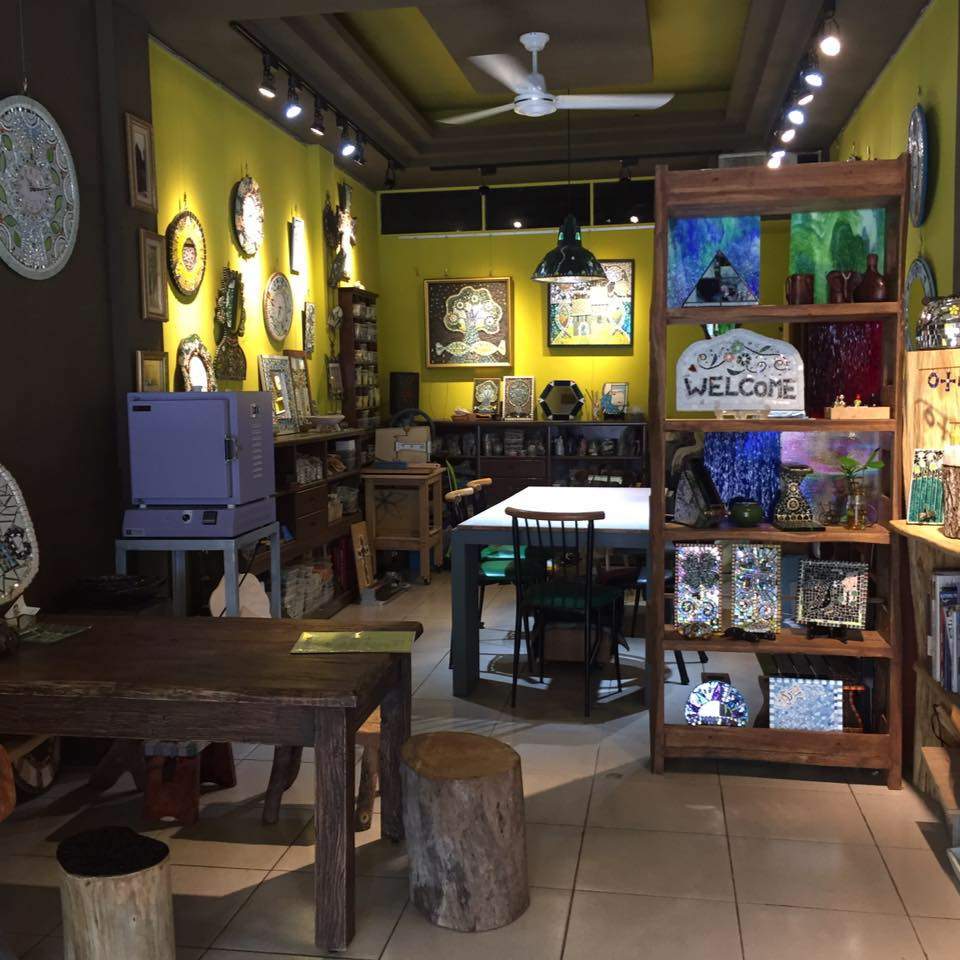
Most people think of wall and floor decoration at the mention of “mosaic,” however, mosaic art has thousands of years of history. This method of creating a pattern with colorful pebbles originated in Mesopotamia and the technique holds an important place in European Art History. Today, mosaic techniques are used in places from public structures to home decoration with common materials including glass, wood, plastic, and ceramic. Now, you can experience the fun of mosaics in Taitung!
YY Mosaic Workshop is located near the Liji Badlands in Beinan Township. YY Mosaic’s name (glass, wood, ‘ma’) comes from the main mosaic material (glass), and the first two mandarin characters from woodwork and mosaic (‘ma-sai-ke’). Co-founders Xunli Chung and Huimei Ko are originally from Taipei and are skilled in mosaic and glass art. Their works are vibrantly colorful and fun creations. Finding that mosaic was not widely known in Taitung, the two decided to open the workshop in 2016. The workshop is their workspace and can also be used as a DIY art classroom when guests make reservations for courses. Students can create unique and colorful mosaic mirrors, photo frames, pottery, and more. The owners hope to add some fun and color to the land by carefully picking and laying out each mosaic piece. Come and experience the fun of mosaic creation and make a unique piece of work while enjoying the bright scenery of Beinan! (Photo Credit:YY Mosaic Workshop FB)
- Address: No. 1-1 Liji Rd., Beinan Township, Taitung County
- Phone: 0932-079-442
- Opening Time: Wednesdays: 13:00–17:00; Saturdays 09:00–13:00 (please make a reservation for other time slots)
Website: https://www.facebook.com/yy.mosaic/
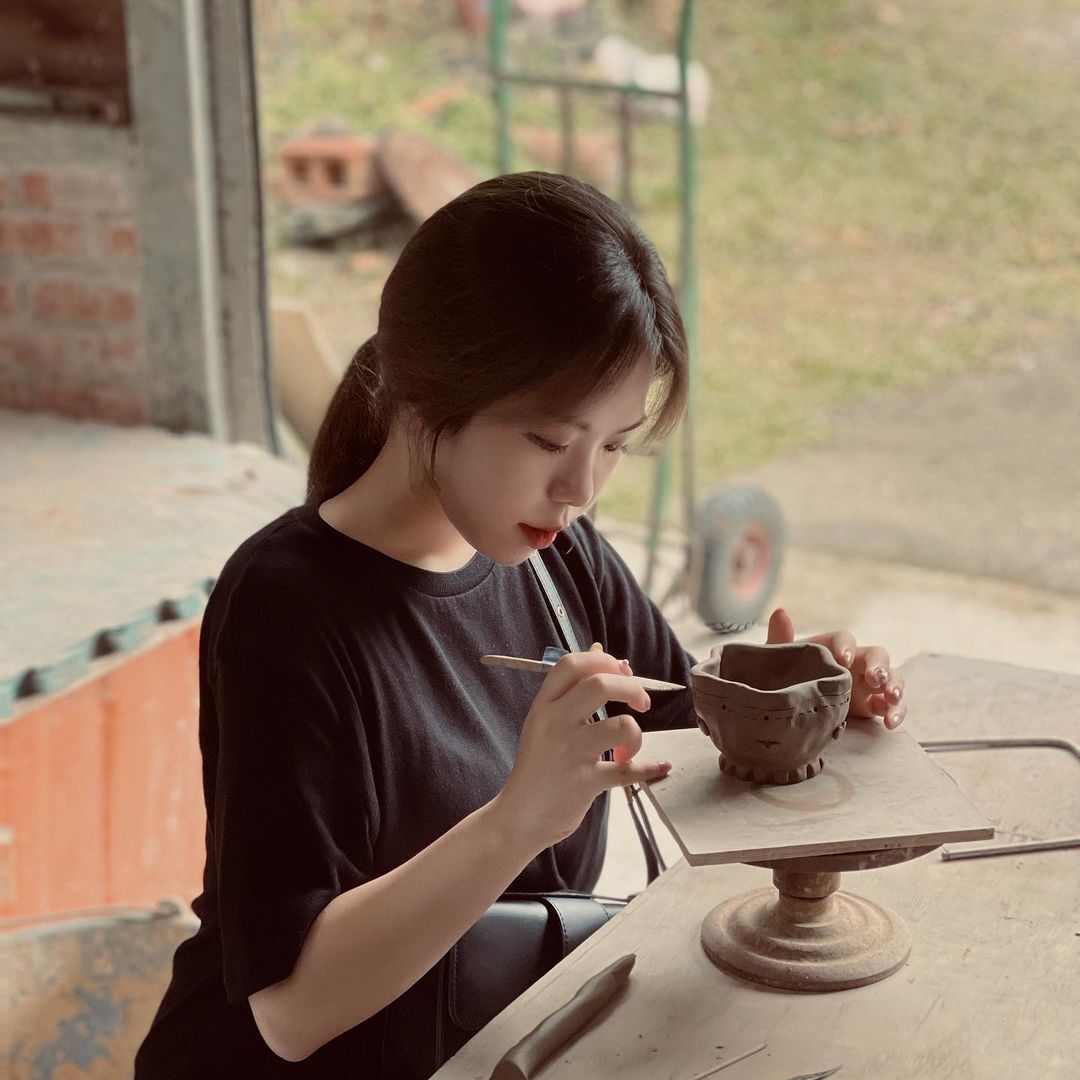
Pottery connects our lives to nature. The ingredients for creating poetry come from the soil and earth. More importantly, pottery has always been an important part of the lives of mankind from the beginning of history. The Paiwan people have a close relationship with pottery. You can see traces of artistic presentation of pottery in their daily lives. However, as our way of life has changed over time, the art of pottery is slowly becoming lost.
Paiwan potter from Mudan, Pingtung, ZudweyI Ruvaniyao, also known as “A-Liang,” has over 25 years of experience working with clay. He created the Nine Birds Pottery Workshop in the mountains of Chulu. “Nine Birds” comes from the name of the neighborhood “Xinbanjiu” (the character jiu is composed of the character for nine and the character for bird). Taoshao (pottery) comes from Japanese pottery and other famous potters. The name is a blessing and promise in hopes to pass this artform from generation to generation.
Nine Birds Pottery Workshop has an electric, gas, and wood kiln. The creations use materials found locally—driftwood and sugar apple branches—and various firing techniques are used to create a variety of pieces. Many arts and crafts courses are also offered at the workshop, such as “Story Time Mugs” so that guests can create one-of-a-kind pottery tableware. (Photo Credit:IG@ulani 870901)
- Address: 954 No. 42 Xinbanjiu, 32 neighborhood, Chulu Village, Beinan Township, Taitung County
- Phone: 0932-582-058
- Opening Time: 9:00-12:00; 13:00-17:30 (Closed on Mondays. Please call to make a reservation)
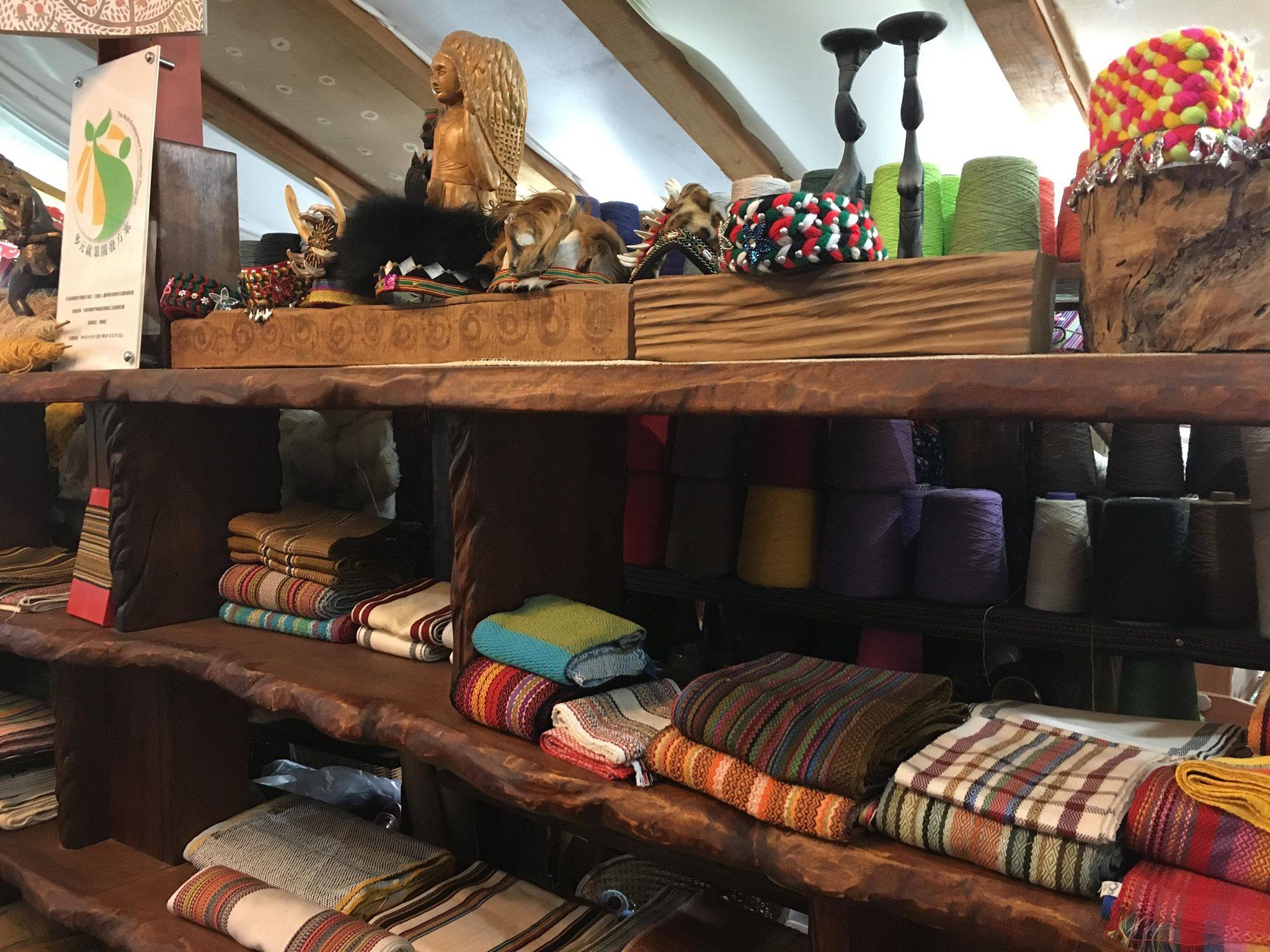
Are you interested in traditional Bunun clothing? Want to learn more about how to weave or experience traditional Bunun weaving techniques? The perfect class is ready for you at the Abus Bunun Traditional Clothing Studio!
To the Bunun people, weaving is used for more than just creating clothing, it represents the art and culture of the tribe. It shows respect towards nature and emphasizes the importance of family. However, as the tribe continues to decrease in population, this skill is in danger of becoming a lost art. Abus decided to return to his home tribe to inherit his mother’s skills. He plants ramie and spins it into thread, promoting traditional Bunun fabric, woven patterns, and weaving techniques. He created this weaving cultural center so that more people will have the opportunity to see and learn about the techniques and wisdom that can be found within the Bunun weaving skill.
Traditional Bunun clothing typically has a white base. The long-striped pattern represents blessing, care, and love. The workshop offers a series of courses that will allow you to learn beading skills, the tools used and the different weaving techniques. You will learn how to tailor your own craft supplies and go out to the wild to learn about plants as well as collect natural resources. (Photo Credit:FB@Abus Bunun Traditional Clothing Studio)
- Address: No. 160-1 Shengping Rd., Yanping Township, Taitung County
- Phone: 089-561-164
- Opening Time: 09:00–20:00(reservation required)
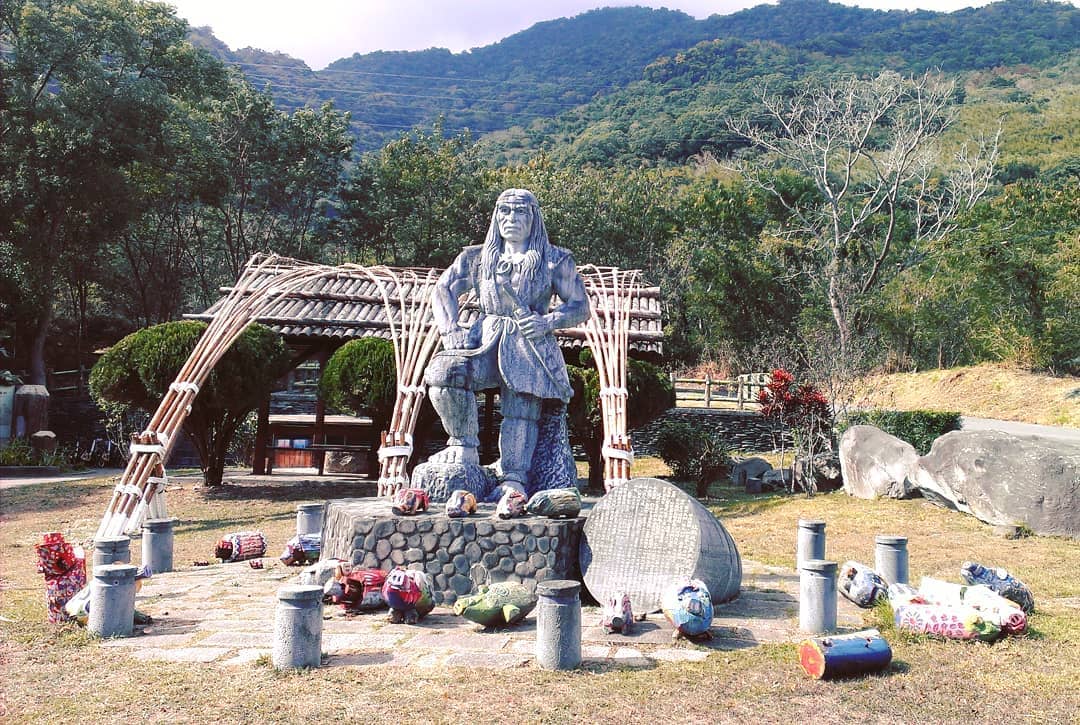
Haiduan Township, the largest township in Taitung, is located in the Northeastern side of the County. This township is where the majority of the Bunun people had gathered and currently live. The Bunun Cultural Museum was established in February of 2002. The Museum focuses on “Culture, Rest, and Education.” It provides entertainment and a space for exhibitions and performances while helping to preserve the traditions, connecting tourism with local industries, and bringing the people together.
The Bunun Cultural Museum is situated on a spacious area of over 1.37 hectares. The building is split into the east and west wings. A performance area for important Bunun tribal and cultural events and culture exhibition hall are located in the east wing. Visitors will find a beautiful botanical garden in the west wing. There are three stories to the Museum. The information counter is on the first floor, along with some resting areas and exhibition space. The second and third floor are mainly used as exhibition space. Bunun history and traditional tools, items, wood carvings, and clothing are displayed here. A variety of Bunun themed exhibitions are also held here periodically. The exhibition route is logical and clear, with abundant and intriguing content that will bring you into a Bunun cultural treasure trove. The inclined hallways between the second and third floors are like time travel portals where a collection of historic photos of the Bunun people’s early days in Haiduan Township are displayed. These black and white portraits show glimpses of what life was like in the past. The botanical garden is a beautiful and quiet escape. Five traditional Bunun houses are displayed in the garden and visitors are welcome to rest in these houses that are decorated with traditional furniture from the Litu, Jiuliang, Tjusinlung, Meilan, and Kaneiwan tribes.
So much of Bunun culture is gathered here at the Bunun Cultural Museum. You can even come try on traditional Bunun clothing free of charge on Saturdays and Sundays. The Bunun Cultural Museum is a must see for any history buff traveling to Taitung!(Photo Credit: IG@traveller_didier)
- Address: No. 56 2nd Shanping Neighborhood, Haiduan Village, Haiduan Township, Taitung County
- Phone: 089-931-638
- Opening Time: 09:00–16:30 (Closed on Mondays and National Holidays)
- Ticket Price: Free of charge
Website: https://museum.haiduau.gov.tw/
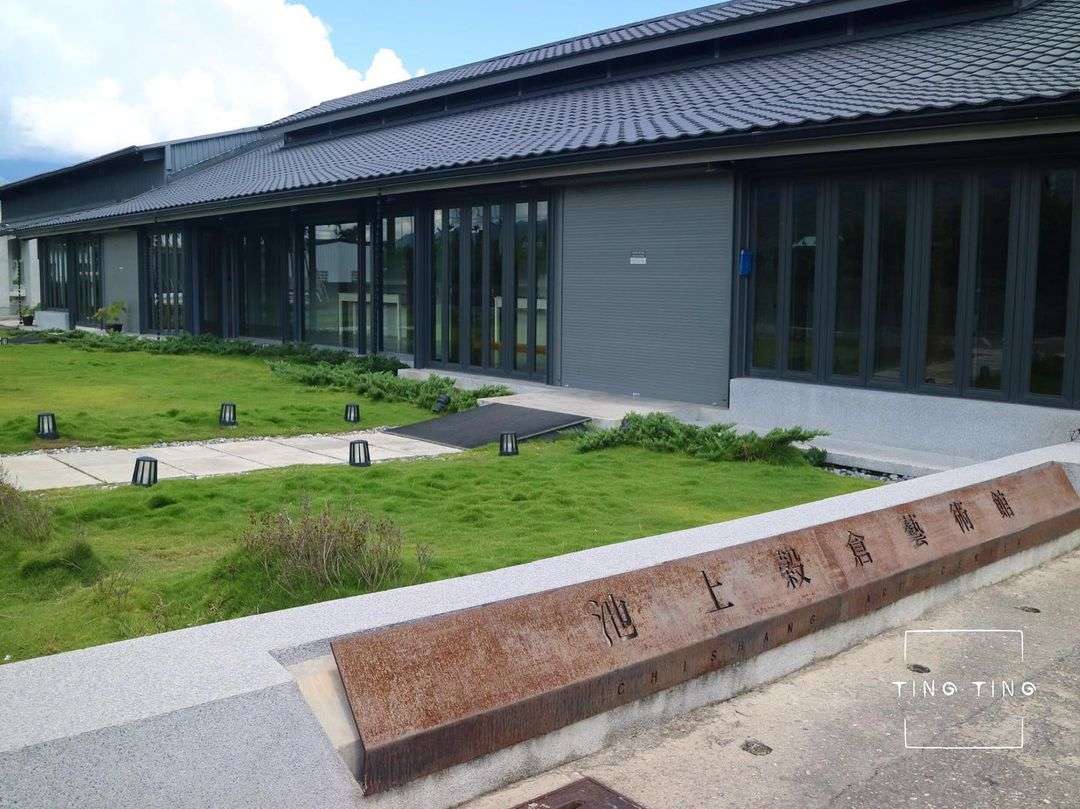
Chishang is a rice town but also a town that full of fascinating culture and art. Expansive rice paddies, rice husks drifting in the air, quaint rural towns, and intriguing folk customs are all typical elements of Chishang Township. The simple lifestyle and innocent people in Chishang provide the best soil for the blossoming of artistic creation and inspiration. Chishang Art Center is one of the crystals of art. You definitely don’t want to miss it when you visit Chishang.
The Chishang Art Center is located at the corner of the town, not far from Chishang Station and Mr. Brown Avenue. In 2014, the Lovely Taiwan Foundation launched the “Chishang Art Village” project, inviting a number of talented artists to stay in Chishang and share art designs with the local residents. Mr. Liang in Doremi Company cooperated with the Lovely Taiwan Foundation in the following year. They offered their barn as an exhibition venue and helped the construction of the Chishang Art Center. Before discussing with the local residents how best to renovate the barn into its current state, Mr. Liang and the design team spent over a year absorbing the essence of local life in Chishang. The majority of the original wooden structure was preserved, while steel was used to strengthen its foundation. Additionally, new roof tiles were added for better heat insulation. Hence, the old dilapidated barn was transformed into an art and cultural venue that preserved the characteristics and local memories of the Chishang people. Since officially opening in 2017, the Chishang Art Center has become a unique cultural landmark of Chishang, and now regularly serves as the location for a number of engaging art exhibitions. It has truly become a beacon for the promotion of local art in Chishang. Friendly Reminder: Eating and drinking are strictly prohibited in the museum. Please also note that pets are not allowed in the museum. (Photo Credit: IG@taiwanting_fukuoka)
- Address: No. 6, Zhongxi 3rd Road, Chishang Township, Taitung County
- Phone: 089-862-089
- Opening Time: 10:30 AM-5:30 PM (Closed on Monday and Tuesdays)
- Ticket Price: Full Ticket 50 NT, Concession Ticket 20 NT (Free Entry for Chishang Residents)
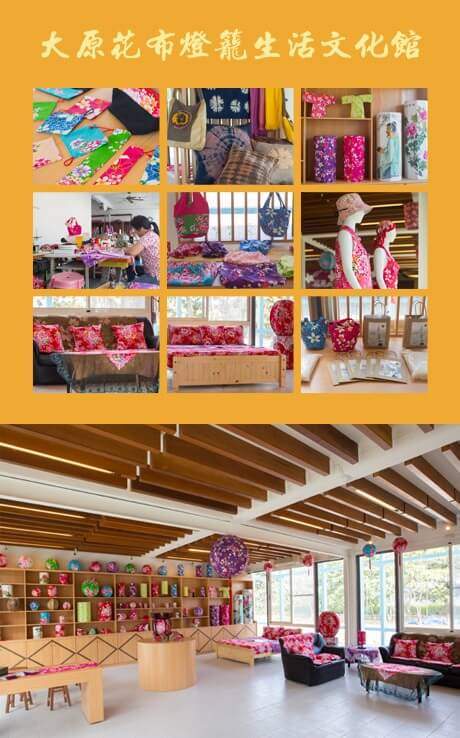
Bright and eye-catching Hakka printed cotton, printed with blooming peony flowers is what you will find here. Hakka printed cloth is a type of Hakka traditional attire. It has become a characteristic of the Hakka people, and embodies the memories of the ethnic group. Hakka printed cloth is not only used to make clothing, but also headscarves, lunch towels, sleeves… When you see this printed cloth, a series of life scenes in your memories will reappear suddenly. The Hakka Cotton Print Lantern is a symbol of celebration for the Hakka people. Hang up lanterns at the time of New Year, weddings, childbirth, and shop opening to light up the happiness and warmth of the family.
In 2002, with the help of the Community Development Association, the only Cotton Print Lantern Museum in Taiwan was established in Luye Ruiyuan Community in Taitung. The cultural hall was remodeled from a farmer’s classroom. Hand-made printed lanterns of various shapes and sizes are hung, conveying a strong rustic style. The lanterns developed and produced by the museum are popular. Domestically, they are sent to the Presidential Palace, the Executive Yuan, the Legislative Yuan, and other government agencies. Internationally, they are exported to the United States, Japan, and South Korea. The museum currently also accepts orders for printed lanterns from private groups.
- Address: No. 156, Tongxing Road, 15 Neighborhood, Luye Township, Taitung County
- Phone: 089-580492
- Opening Time: 09:00-18:00 Open all year round
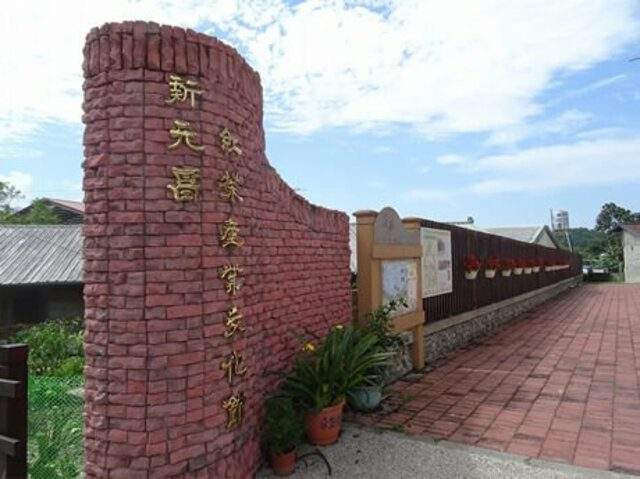
Tea is not just a drink. It has thousands of years of tea ceremonies, tea art, and tea culture behind it. Tea leads to a way of savoring life. Yong’an Village in Luye Township is located at an altitude of 368 meters. The fields have smooth drainage, and the large temperature difference between day and night in early spring and late winter makes it a suitable spot for growing tea. This allowed Tseng-Kun Wen, the late Father of the Taitung Tea Industry, to open a tea factory here in 1966 to establish his tea kingdom. Hsin Yuan Chang Tea Industrial Cultural Center is the first cultural center of its kind in Taiwan.
Hsin Yuan Chang Black Tea Industrial Cultural Center has different exhibition areas. Commissioners in the museum explain the process of tea picking, withering, atting, tossing, fixation, rolling, drying, ball-rolling, roasting, tasting, etc. They clearly explain the stages from tea making to taste. Once you know the skill of making tea and mastering the essence of tea, you will come to better understand how to taste the shape, color, aroma, and taste of tea. Here you can also participate in the lei cha experience, where you can make tea by grinding the tea leaves yourself, and enjoy a cup of handmade tea while chatting with family and friends. You can also walk outside int the garden to admire the lush tea fields. This center allows you feel the essence of tea from the beauty of Luye tea fields.
- Address: No. 451, Yong’an Road, Yong’an Village, Luye Township, Taitung County
- Phone: 089-551016
- Opening Time: 09:00~18:00 Open all year round
- Ticket Price: free
其他場所
Taitung Shoreline – A feast of art and literature by the sea
Discover Taitung> Art Venues >Taitung Shoreline – A feast of art and literature by the sea Taitung Shoreline - A feast of art and literature by the sea [...]
East Valley line of Taiwan – back mountain pastoral literary style
Discover Taitung> Art Venues >East Valley line of Taiwan - back mountain pastoral literary style East Valley line of Taiwan - back mountain pastoral literary style [...]
Taitung’s art island
Discover Taitung> Art Venues >Taitung's art island Taitung's art island Green Island and Lanyu seem to be the fringe of the urban area, but they have [...]
Southeast Taiwan loop – arts and culture in Taitung
Southeast Taiwan Loop - Arts and Culture in Taitung The South Link Line is a scenic rail line running along the southern tip of Taiwan from Pingtung to Taitung. With [...]






